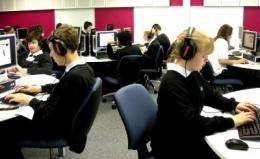Are Computer Tutors the key to learning for Autistic pupils?

A series of open days for school pupils with autism have been held at the University following a three-year-long project funded by EPSRC during which researchers worked with the youngsters to develop a computer-based tutor aimed at improving their mathematics learning.
A mixture of mainstream pupils and pupils with Autism Spectrum Disorder (ASD) from schools from the south west and Wales were invited to attend workshops at the University of Bath, where the results of the project were celebrated.
Young people with ASD can be assisted in the classroom using computer-based tutors to supplement their learning. However tailoring a computer tutor to meet the individual needs of children with ASD is a challenge, and one that a collaborative University of Bath research team, comprising computer scientists and psychologists, has been working to overcome.
A novel aspect of the research is the very active participation of the pupils throughout the design process which has resulted in a tutor designed by the children themselves for their own use, and explicitly addressing their needs.
Dr Hilary Johnson, expert in Human Computer Interaction from the University’s Department of Computer Science, said: “The project aim was to create a tutor with novel interface and design features that will help the children’s learning.
“To do this, we wanted to involve the children with ASD in the design process right from the beginning. We worked with them in the classroom, and provided a whole range of art based materials to allow them to contribute in a very visual way to the process.
Dr Mark Brosnan, an expert in autism from the Department of Psychology said, “The open days at the University were our opportunity to give something back to the pupils who were involved.
“They enjoyed learning about University life, and taking part in a workshop with Bristol-based animation company Aardman, behind the creation of Wallace and Gromit, which allowed the pupils to engage further with a creative activity and gain first hand experience of creating the famous TV characters.”
During the project the pupils worked with the researchers to describe exactly how they’d like the computer screen to look, how they would like it to work, and the type of response they should receive when they answered questions rightly or wrongly. The research team then integrated this information into the maths tutor.
Justine Guatieri, Learning Support Assistant from Brislington Enterprise College Autistic Unit said: “Throughout the project I noticed a big leap in our pupil’s abilities to work as a team, considering the thoughts and feelings of their peers.
“Making the research visual, using drawing and creativity, rather than verbal was essential in ensuring our students could participate, and they’ve really benefited from the open days at the University where they have had the opportunity to see the results of their work in the final maths game.”
Finley Hunt, 13, from Brislington Enterprise College, was responsible for the drawings used in the maths game. He said: “I drew a map of the world, with an island, trees and roads. The researchers used my drawings in the maths game which was good.”
Ryan Sanders, 14, said: “I came up with the idea of using a car, because cars are very popular things and everyone uses them. I wanted to do something with the satnav, so I decided it should ask us questions.”
Through developing an understanding of ASD preferences and needs, the research team was able to create a product that would address learning needs without alienating the pupils.
Dr Brosnan said: “Being involved in this project has been hugely rewarding. Working with children with ASD and seeing them being able to contribute is more than we could have hoped for, and the children have enjoyed being engaged in the research process.
“The result of this research is that we are nearing the finalisation of a system that has been designed by children with ASD for children with ASD.”
For more information about this project, see the project website.















